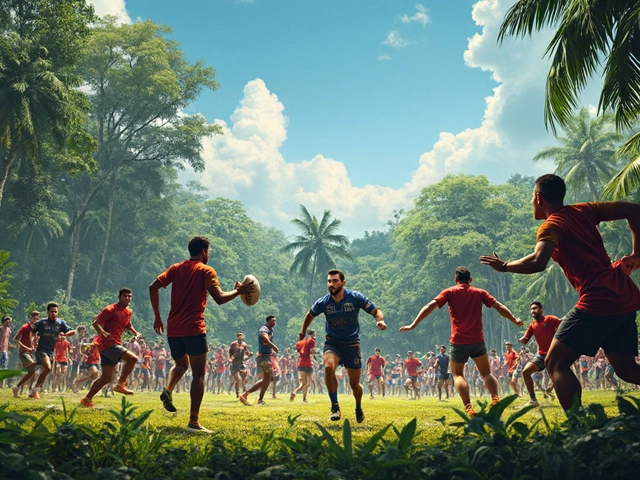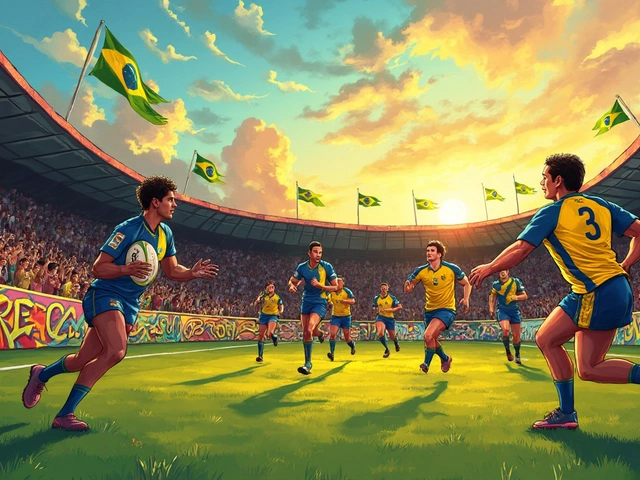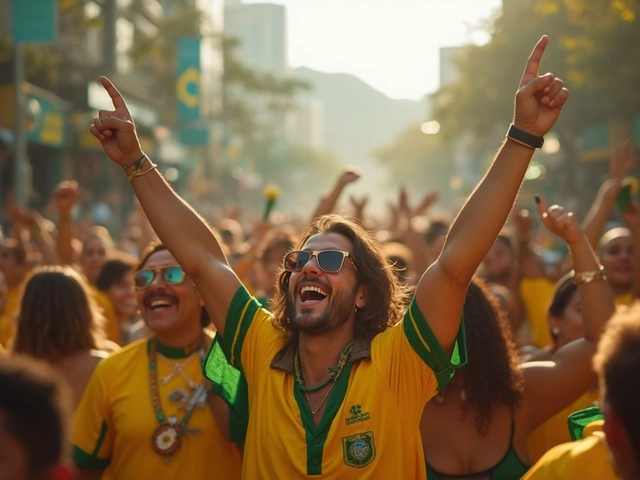In the realm of international football, few names evoke a sense of awe and admiration quite like Brazil. Known for their flair, passion, and unmatched skill on the football field, Brazil has left an indelible mark on the history of the World Cup. Delving into their achievements reveals stories of relentless pursuit, iconic matches, and the unforgettable roar of victory. Over the years, Brazil has not just competed; they've set the gold standard for national teams everywhere.
A journey through Brazil's World Cup accolades is a journey through time itself, illustrated by the vibrant colors of their jerseys and the dazzling performances of their players. With each World Cup win, they've drawn fans closer, inspiring young footballers and uniting a nation under the flag of sporting excellence. It's a legacy that speaks to not just the numbers behind their victories but the soulful artistry of football, Brazilian style.
- Introduction to Brazil's World Cup Legacy
- The Golden Years and Their Significance
- Breakdown of Each World Cup Win
- Legendary Players and Iconic Goals
- Impact on Brazilian Culture and Future Aspirations
Introduction to Brazil's World Cup Legacy
Brazil's history in the World Cup is more than just a tale of trophies; it's an odyssey etched into the very fabric of the sport itself. From the sun-soaked beaches of Rio de Janeiro to the bustling streets of São Paulo, football is a way of life, a tapestry woven into daily existence. The passion of the Brazilian people, matched only by their skill and creativity, has made their national team a symbol of excellence and artistry on the grandest stage of them all, the World Cup. With a record number of five triumphs, Brazil holds a unique spot in the annals of football history, making them the most successful nation in the tournament.
The journey began in 1930 when Brazil made its debut in the inaugural World Cup. Although they did not make much of an impact initially, it set the stage for what was to come. The real breakthrough came in the 1958 tournament in Sweden, where a young team dazzled the world. Players like Pelé and Garrincha rose to prominence, showcasing a brand of football characterized by flair, speed, and an innate sense of freedom. That victory was not just seen as a win on the scoreboard; it was a declaration to the world that Brazil had arrived, ready to reshape how football was perceived and played.
The 1962 World Cup in Chile saw Brazil defending their title successfully, with a team that, while missing an injured Pelé, demonstrated resilience and depth. It was in 1970 in Mexico that Brazil cemented their legacy with perhaps the greatest team ever assembled, led by a now-mature Pelé. The fluid team play, ingenious tactics, and astounding goals left an enduring imprint on football as a sport. Commenting on Brazil's football artistry, Sir Bobby Charlton once noted, "It was like they're playing music." The quote perfectly encapsulates the majestic style that enchanted fans worldwide.
Interestingly, the success witnessed by Brazil spilled beyond the boundaries of the football pitch. It became interwoven with the country's culture and identity, influencing music, fashion, and even politics. As the Brazilian team lifted the trophy, they became emblematic of joy, creativity, and the spirit of the nation. The World Cup victories have not only inspired generations of players but also ignited a sense of national pride and unity among its supporters. The modern team continues to draw inspiration from this rich heritage as they strive to carry the torch forward, still hungry for glory.
Brazil's World Cup legacy is a kaleidoscope of extraordinary players, unforgettable moments, and breathtaking matches. It encapsulates the heart of football itself, an ever-evolving dance of strength and skill framed by the enthusiasm of its devotees. As we recall the historic achievements and pivotal wins, the profound impact of Brazil's World Cup achievements extends beyond numbers, resonating deeply within the global football community. Their journey, unfolding across decades, is a testament to the beautiful game's capacity to unite, inspire, and transform. With a legacy built on dynamic play and vibrant spirit, Brazil continues to be a beacon of footballing wishes and dreams.
The Golden Years and Their Significance
The 1958 World Cup in Sweden marked the dawn of what would later be remembered as the Golden Years for Brazil in the realm of international football. This period began with a transformative moment when a 17-year-old prodigy named Pelé played a pivotal role in leading Brazil to its first-ever World Cup triumph. This victory was not merely a win; it was a defining moment in football history, showcasing the unique style and artistry of Brazilian football to a global audience. The exuberance and fluid movement on the field were unlike anything seen before, setting a standard that teams even today aspire to emulate. Brazil's performance in 1958 wasn't just about skill but about heart and soul. Every pass, dribble, and goal seemed to sing the story of a nation madly in love with the beautiful game.
The journey didn't stop there. In 1962, Brazil came back to claim their second World Cup title in Chile, demonstrating the depth and consistency of their footballing might. This period highlighted Brazil's adaptability as they successfully dealt with the challenges thrown at them, including injuries to key players like Pelé. The team's resilience was embodied in Garrincha, whose dazzling footwork and ability to score crucial goals led Brazil to another victory. Their triumph in Chile was not just a testament to their skill but illustrated the collective strength of their squad. Family-like camaraderie coupled with strategic thinking showed the world that Brazil was not a one-time wonder but a dynasty in the making.
The saga of Brazil's Golden Years came to a roaring climax with their third World Cup victory in 1970 in Mexico. This tournament is often heralded as one of the greatest showcases of football ever witnessed. With iconic players like Pelé, Jairzinho, and Tostão, Brazil captivated fans with their perfected brand of attacking football. The team won every match they played, leaving audiences awestruck with their tactical innovation and artistry. This 1970 squad is frequently cited as not just the best Brazilian team, but one of the best football teams of all time. Their defeat of Italy 4-1 in the final remains etched in history, a near-mythical match characterized by fluid play and poetic teamwork.
The significance of the Golden Years lies in the transformation of how football was perceived across continents. Before Brazil's influence, football was viewed largely as a tactical and physical game. With their triumphant wins, Brazil brought a fresh narrative; that football could be breathtakingly beautiful, blending skill with freedom of expression. These years cemented Brazil's place not just in record books but in the hearts of millions worldwide. They inspired a generation of players to emulate the Brazilian style, focusing on attacking flair and skillful individuality. The Golden Years laid the foundation for Brazil's enduring reputation as a powerhouse in the sport.
Reflecting on these iconic moments, Horst Dassler, a notable figure in sports marketing, once commented, "Brazil is the best advertisement for football. The world plays the way they dream."
His words capture the essence of what those years meant for the global football community. It was a time when the world witnessed not just victories but enchanting performances that transcended sports, turning football into an art form.
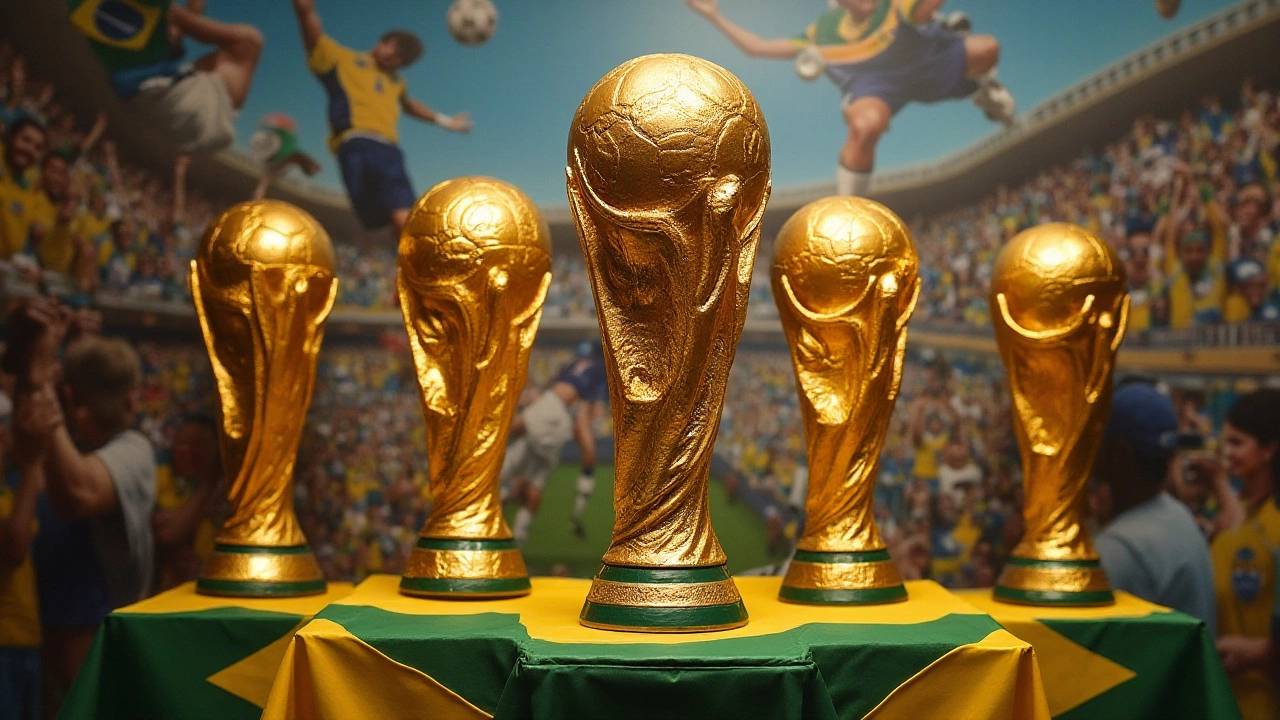
Breakdown of Each World Cup Win
When we think about the grandeur of the World Cup, it's impossible not to mention Brazil. With their thrilling victories on the world stage, Brazil has cemented its place in football history. This South American country has won an impressive five World Cup titles - a record that speaks volumes about their skill and tenacity. Their journey to each title offers a tapestry woven from dedication, teamwork, and a distinctive style of play.
The story begins in 1958 when Brazil claimed its first World Cup victory in Sweden. It was a tournament to remember, showcasing the talent of a young prodigy named Pele. Brazil defeated the host nation to lift the trophy, winning 5-2 in the final. This victory was more than just a win; it signaled the dawn of a new era in football. Pele's extraordinary performance left an indelible impression, marking him as a future legend and propelling Brazil into the spotlight for years to come.
Fast forward to 1962, and Brazil found itself on the top of the world again. Held in Chile, the tournament was a testament to the resilience and skill of the team, even in the absence of an injured Pele. Brazil adapted and triumphed, driven by players like Garrincha and Amarildo. Their campaign demonstrated Brazil's depth and ability to succeed against all odds. The dedication and strategic play were key elements that helped them secure their second consecutive title, cementing their status as a football powerhouse.
After a brief interlude, the World Cup of 1970 in Mexico brought yet another triumph for the Brazilian squad. This time, under the tactical mastermind Mario Zagallo, the team revealed a refined and aggressive style of play that overwhelmed their opponents. It was a dream team featuring icons such as Jairzinho, Tostao, and once again, the legendary Pele. They dazzled the world with creative play and impeccable teamwork, culminating in a 4-1 victory against Italy in the final. This win was a masterclass in attacking football and widely considered one of the greatest teams of all time.
The road to the 1994 World Cup title was paved with hard work and determination. Held in the United States, this tournament marked Brazil's return to glory after a 24-year drought. The team, led by the indomitable Romario and Dunga, displayed a balanced blend of offense and defense. The final against Italy was a tense affair, ultimately decided in a dramatic penalty shootout. Roberto Baggio's infamous miss gave Brazil its fourth World Cup, sparking joyous celebrations across the nation. This victory reignited Brazilian pride and reminded the world of their unrivaled passion for the sport.
Brazil's most recent triumph came in 2002 in South Korea and Japan. This World Cup was remarkable for the revival of star player Ronaldo, who overcame injury setbacks to lead his team to victory. Alongside talents like Rivaldo and Ronaldinho, Ronaldo's performance was stellar, scoring twice in the final against Germany and helping Brazil secure a historic fifth title. Known as the "Three Rs" partnership, their teamwork and individual brilliance left fans and rivals alike in awe. This victory made it clear that Brazil’s football prowess was not just history—it was an ongoing legacy.
"Brazil has always been magnificent in its footballing artistry, blending skill with charm and passion." – Tom Finney, Renowned English Footballer
Each World Cup victory has contributed layers to the story of Brazil's World Cup legacy. Whether it was the flair of young Pele, the strategic acumen of Zagallo's squad, or the relentless spirit of Ronaldo's team, each triumph reflects the heart and soul of a nation that lives and breathes football. Brazil's enduring success on the world stage is a tribute to their commitment to the game and an inspiration for future generations of footballers.
Legendary Players and Iconic Goals
When one thinks of Brazil's indelible mark on the World Cup, the first images that come to mind are of brilliant players striding across the pitch with unwavering confidence. These legends have etched their names in football history, defining what it means to be a world-class player. Among them, Pelé stands tall with his unmatched charisma and skill. Emerging onto the international scene in 1958, Pelé dazzled the world at just 17, becoming the youngest player to score in a World Cup final. His goals were not just points on the scoreboard but moments of magic that captivated fans worldwide.
Ronaldo, often remembered for his distinct playing style and remarkable agility, is another cornerstone of Brazil's World Cup triumphs. His return to the World Cup in 2002 after severe injuries was nothing short of inspirational. Scoring eight goals in the tournament, Ronaldo secured the Golden Boot and led Brazil to their fifth title. His performance in the final against Germany, where he netted twice, is forever immortalized in World Cup lore. It's said that "Ronaldo was a phenomenon who could ignite the crowd with just a touch," and those who witnessed his prowess would immediately agree.
The story of Brazilian football wouldn’t be complete without mentioning Zico, who left an indelible mark despite never winning the World Cup. Known as the "White Pelé," his skillful play and balance made him a joy to watch, especially during the 1982 World Cup. Romário, too, brought his own brand of flair and skill in 1994, guiding Brazil to victory with his decisive strikes and uncanny ability to be in the right place at the right time. Each of these players brought not just strength and skill, but a distinct Brazilian flavor that left audiences speechless.
Iconic goals from Brazilian artists of the game are not just remembered for their technical perfection, but for the moments they created. Bebeto’s celebration in 1994, cradling an imaginary baby following his goal, became a hallmark of joy in football culture. Then there was Roberto Carlos’s free-kick against France in 1997, which defied physics and left viewers around the globe in awe. His strike remains one of the most memorable goals ever scored, a testament to Brazilian creativity and innovation on the field.
As players come and go, newcomers like Neymar carry the torch. With his own unique brand of acrobatics and agility, Neymar weaves through defenses, promising to continue the legacy built by his predecessors. He has already lit up many World Cup tournaments with his performances and goals, igniting hope that icons will always emerge from Brazil’s footballing factories. With each generation, Brazil not only finds new stars but redefines what it means to be a legend on the international stage.
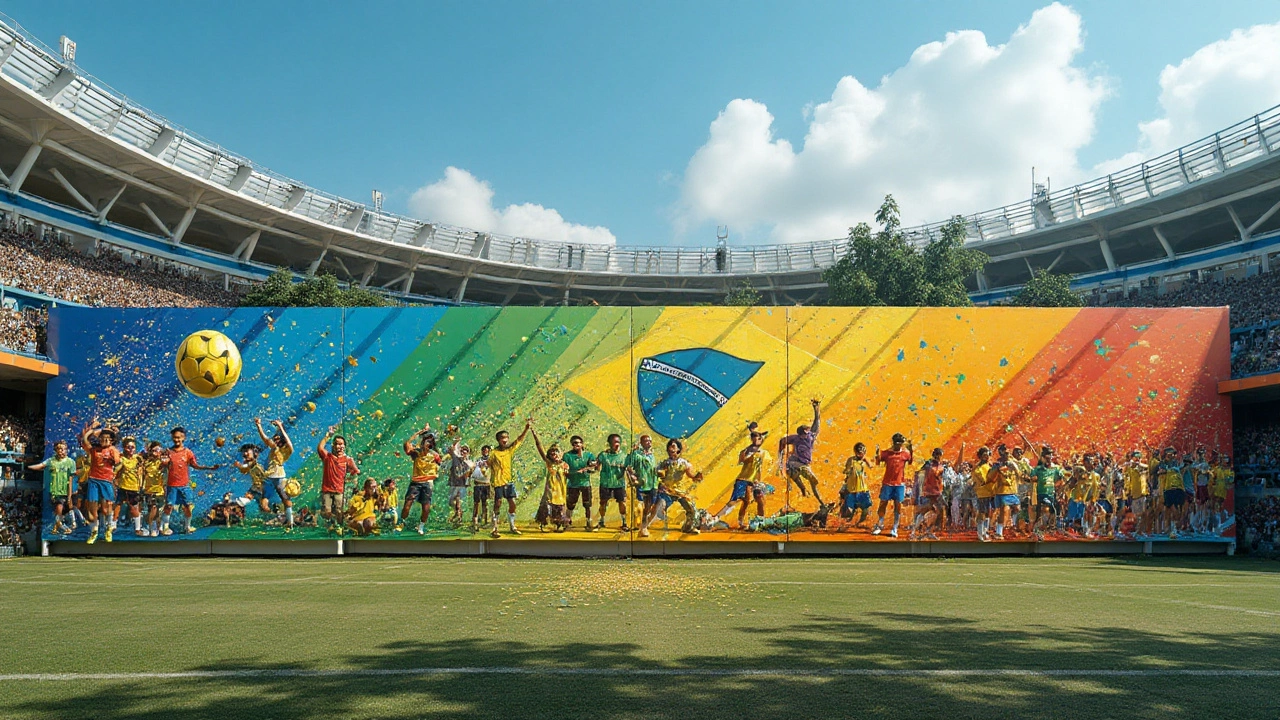
Impact on Brazilian Culture and Future Aspirations
Brazil's extraordinary achievements in the World Cup have significantly shaped the nation's cultural identity, embedding football into the very fabric of Brazilian society. The sport has transcended the pitch to become a symbol of national pride, unity, and hope. From the bustling streets of Rio de Janeiro to the remotest corners of the Amazon, football is more than a game; it's a way of life. This nationwide passion finds its roots in the legendary triumphs that Brazil has celebrated on the global stage, serving as a shared narrative that connects generations and communities. Football matches are often community events where families gather to watch games, reinforcing a sense of belonging and cultural cohesiveness.
Brazil's victories have frequently acted as a stimulus for social change and economic development. Each World Cup win instills a sense of collective achievement that galvanizes the country, inspiring improvements in infrastructure and investments in sports facilities across diverse areas. Education institutions increasingly integrate football into their curricula, nurturing the next generation of players who might one day don the iconic yellow jersey. This emphasis on sports development fosters aspirations not just among boys but girls too, as women’s football gains momentum, mirroring the success of their male counterparts.
The famed Brazilian style of play – characterized by exceptional creativity, technical skill, and exuberance – influences how many view the world’s most popular sport. As one renowned sports journalist once said, "Brazil plays not just with their feet but with their hearts," a sentiment that captures the spirit of Brazilian football.
The future of football in Brazil holds both promise and challenges. Behind the fanfare, there’s a concerted effort to nurture grassroots talent, ensuring that Brazil remains a powerhouse in the football world. The nation's ambition to continue leading by example involves improving coaching methods and investing in young talent while balancing modern training techniques with the traditional Brazilian flair.
Yet, alongside these aspirations are the expectations from the fervent fanbase. The pressure to maintain their esteemed position on the global stage is palpable, urging both players and managers to uphold the legacy forged over decades. As they look forward, Brazil prepares to innovate their strategies and enhance performance capabilities, not just aiming to clinch another World Cup but to build on the ethos that makes their style so mesmerizing.
"Football isn’t just something that happens on the field for us. It's life," a sentiment echoed by many Brazilians, encapsulating the profound impact the sport holds in their hearts and homes.

